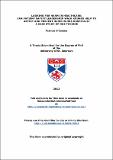Looking for harm in healthcare : can Patient Safety Leadership Walk Rounds help to detect and prevent harm in NHS hospitals? A case study of NHS Tayside
View/
Date
22/06/2012Author
Supervisor
Metadata
Show full item recordAltmetrics Handle Statistics
Abstract
Today, in 21st century healthcare at least 10% of hospitalised patients are subjected to some degree of unintended harm as a result of the treatment they receive. Despite the growing patient safety agenda there is little empirical evidence to demonstrate that patient safety is improving. Patient Safety Leadership Walk Rounds (PSLWR) were introduced to the UK, in March 2005, as a component of the Safer Patients Initiative (SPI), the first dedicated, hospital wide programme to reduce harm in hospital care. PSLWR are designed, to create a dedicated ‘conversation’ about patient safety, between frontline staff, middle level managers and senior executives.
This thesis, explored the use of PSLWR, as a proactive mechanism to engage staff in patient safety discussion and detect patient harm within a Scottish healthcare system- NHS Tayside. From May 2005 to June 2006, PSLWR were held on a weekly basis within the hospital departments. A purposive sample, (n=38) of PSLWR discussions were analysed to determine: staff engagement in the process, patient safety issues disclosed; recognition of unsafe systems (latent conditions) and actions agreed for improvement. As a follow-up, 42 semi-structured interviews were undertaken to determine staff perceptions of the PSLWR system. A wide range of clinical and non-clinical staff took part (n=218) including medical staff, staff in training, porters and cleaners, nurses, ward assistants and pharmacists. Participants shared new information, not formally recorded within the hospital incident system. From the participants perspectives, PSLWR, were non threatening; were easy to take part in; demonstrated a team commitment, from the Board to the ward for patient safety and action was taken quickly as a result of the ‘conversations’.
Although detecting all patient harm remains a challenge, this study demonstrates PSLWR can be a useful tool in the patient safety arsenal for NHS healthcare organisations.
Type
Thesis, PhD Doctor of Philosophy
Collections
Items in the St Andrews Research Repository are protected by copyright, with all rights reserved, unless otherwise indicated.

